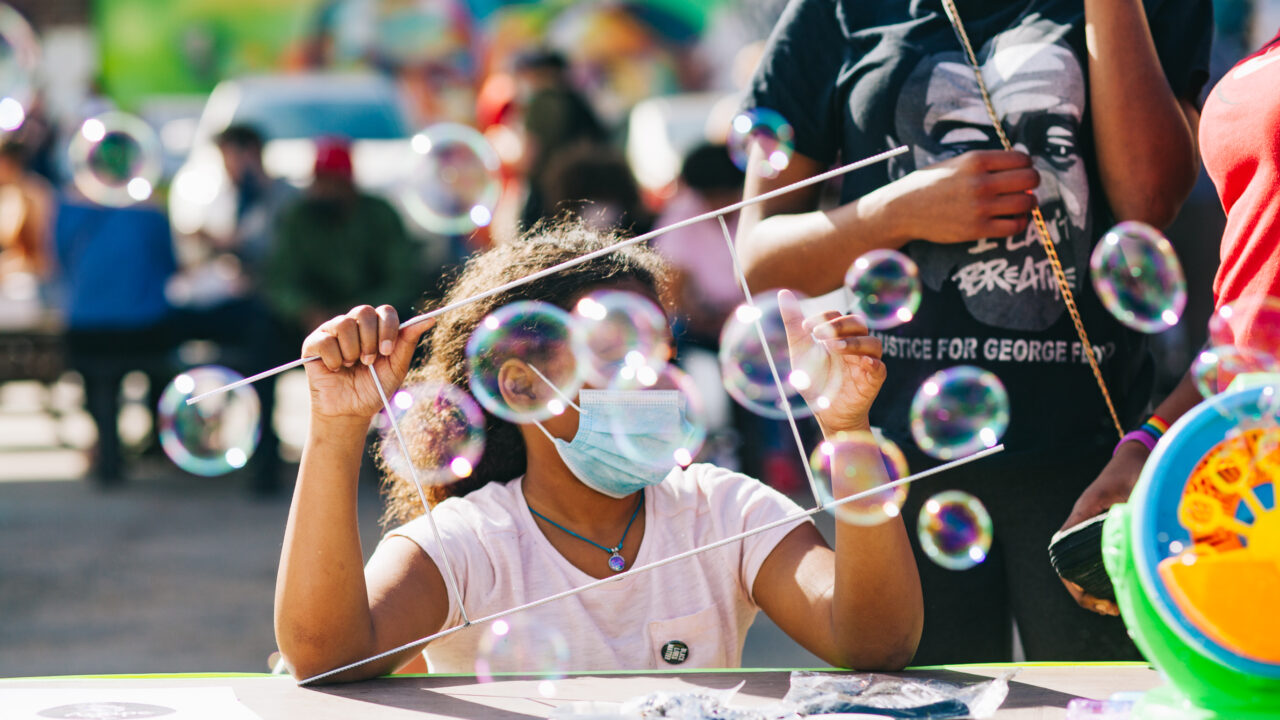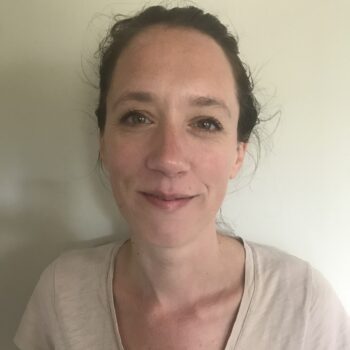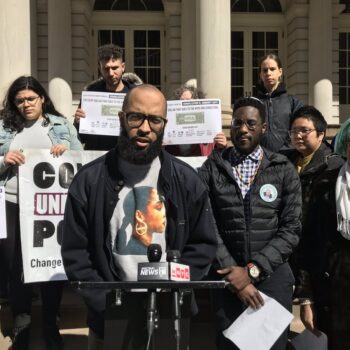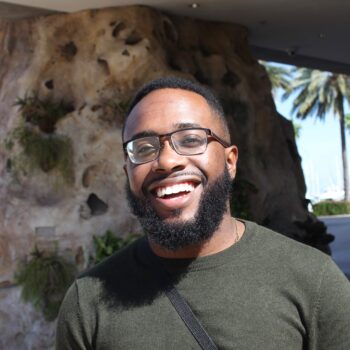Darnel Joseph is a volunteer leader with Dream Defenders — a multiracial movement of young people organizing for a new vision of the state, one that divests from policing and invests in care. Kesi Foster is the co-director of Make the Road New York’s Youth Power Project, which organizes young people throughout New York City and Long Island around education justice, including getting police out of schools. They sat down with The Forge’s Lindsay Zafir to talk about their work organizing young people, and what a childhood free from police would look like. This interview has been edited and condensed.
Lindsay Zafir: Tell me about the past year. How did the uprisings change your work, and what remained the same?
Kesi Foster: The uprisings in New York may end up being a galvanizing and unifying mechanism around efforts to defund the NYPD and [win] police-free schools. One of those reasons is because [the state] responded with more state repression and state violence. The uprisings led to violent police tactics, not just in New York City but throughout New York State. And I think it laid bare the purpose of policing as an apparatus of the state to maintain racial hierarchy. And so, in some ways, I think it’s possible that across New York State, we’ll see that those uprisings were a moment that’s going to galvanize a larger movement towards what’s going to be a really long protracted struggle, particularly around defunding the NYPD, reducing the size and scope of policing, and ultimately moving more people towards abolishing the prison industrial complex.
Darnel Joseph: The uprisings did a lot to activate a lot of people to become organizers or build coalitions. In our coalition alone, people were asking to figure out how they do their own protests. What do they need? What do they need to be wary of? The biggest thing that we saw in Broward are the people wanting to be involved and just looking at how to keep them engaged. Every time something happens, of course, people are angry, communities want to go out and really fight. But looking forward to the future to really just be like, hey, we all need to come together as a coalition to be one in directing these people towards energy and actions that will breed outcomes that ultimately liberate us.
LZ: What you think the uprisings last year showed about where our movement infrastructure is weak and where it’s strong?
DJ: Something I definitely realized is that there are people who are there to join the work. Dream Defenders and several other people in our coalition were able to put together probably the biggest protest that Fort Lauderdale has ever seen in the past decade. Roughly 3,000 people came out to shout out with us that we’re done dying. But then, as time passed and people’s interests fade, the main issue is, what actionable items we can give people so that they continue doing what they’re passionate about or, at least, being involved in the work right after, would keep them there.
A lot of times we get together for protests and people are just waiting for the next one. Someone called it ambulance chasing, that we’re just waiting for the next thing to be angry about so that we can all come together. Looking at infrastructure from that point of view, it’s just making sure that people can stay engaged with stuff to do.
KF: Having this conversation today, [April 16,] I want to acknowledge that police departments in two different cities killed two young people before they even were able to reach adulthood — Adam Toledo in Chicago and Daunte Wright in Brooklyn City, Minneapolis — while most of the country and the world is watching a trial, the trial of the officer who murdered George Floyd.
As sobering as that can be, for folks organizing on the ground, we should claim some of the victories. When you look at the deep, deep infrastructure that has connected organizations across the country around police-free schools, the sustained organizing that was able to help support folks like Black Organizing Project, that was able to win getting police out of Oakland schools. In Madison, Freedom Inc and other organizations that had been organizing for years to get police out of schools, [they] were able to get police out of their school system. There’s an infrastructure in place that made those victories possible, following the uprisings, and those organizations did amazing organizing in order to move under the chaos of the circumstances.
When you look in New York City, it has been thiry, forty, fifty years of sustained organizing around police brutality and violence in our communities. Following the uprisings, we were able to help move policy, repealing 58 in New York City, which is a law that’s been on the books since the 1970s, which shields police misconduct, correctional officer misconduct. I think we didn’t just see uprisings, we also saw the result of decades of sustained organizing and infrastructure that were able to move things during and after the uprisings. When we take into account the beast that we are fighting against, it can be hard to see in the moment how much progress we’re making. But I think we should take a collective breath and recognize that our organizing is moving things for our people in a way that’s going to really affect material conditions for more organizing grounded in liberation and transformation.
LZ: What is your vision for safety that will replace policing and imprisonment? What does a police-free childhood look like?
DJ: In terms of a police-free childhood, one of the quickest starts would be the removal, of course, of SROs from our schools. But also, to take a better look at the way carceral punishment is weaved into practices in our schools, starting with the way internal suspension is held. You do something, teacher kicks you out, you’re moved to a particular portion of the school where, essentially, you don’t do anything, you sit there in silence, maybe you do work but it’s not productive, it’s not transformative, it’s not addressing any problems.
Of course, when you talk about a police-free childhood, reducing police and replacing police with more counselors who are actually proven to be more useful in addressing issues that our children face than, let’s say, a cop body slamming a 13 year old for having an attitude. Every time that I hear, what are we going to be replacing prisons and police with, it’s not lost on me that none of these things currently address problems. So, my idea for replacing prisons would look a lot like expanding food programs and increasing school budgets for aftercare programs and actually going ahead and addressing homelessness.
KS: You hear this a lot from, especially, politicians: how are we going to create safe communities or safe schools or safe hospitals or safe homeless shelters? What are we going to replace police with, to make these places safe? The police just murdered a 13-year-old child in Chicago. The police are not making anything safer. In fact, the police are bringing violence and all types of extraction, displacement, oppression, violence. And so, it’s about removing the police.
As Darnell eloquently laid out, it is about creating the conditions for our cities and state to provide an abundance of care to our communities, whether that’s in our schools, whether that’s through housing, whether that’s through the healthcare system. It is about removing police — and not just police. It’s not police in themselves as a public institution; they’re working for the state. So, it’s not just about removing police, but it is about creating the conditions where we’re struggling over who is worthy of care in this country. And for generations and decades, since the founding of the country, Indigenous people, Black people, immigrants have not been worthy of care. We’re still organizing and struggling to ensure that we are transforming the systems that are set up, which oftentimes means we have to dismantle them and start something new.
LZ: What’s being said that remains unheard?
DJ: Police don’t actually reduce crime; they respond to it. They’re there and absolutely nothing has changed; things, arguably, have only gotten worse. And if you do see a change, it’s due to external factors like, potentially, reducing the amount of people in an area due to the pandemic.
Another thing I wanted to mention is the importance of building community. It’s my favorite word, community, because it potentially means so much, but in practice, I don’t feel like it’s really being done on an interpersonal level. When you talk about community, do I know the first names of my neighbors? When you talk to elders, there was a better sense of, so-and-so down the street is having this struggle, can we all support them? And you see it a lot online with Go Fund Me, but within your own location, what does that really look like? Are we really building that type of relationship with the people who are actually around us? So that if something does happen or go down, are we able to support them?
KF: I think it’s important for us to focus on what’s being distorted. And so, when you look at the movement to defund the police, which was amplified in the uprisings but this is not the first time that Black communities have called for divesting from police departments, reinvesting and reallocating money that’s going into policing and oppressing us into our care. The roots are in abolishing the prison industrial complex, which is a call that has been around for generations and generations and generations, that’s evolved into the movement now for abolition. And so, the call to defund is a comprehensive, clear call to divest from the power, scope, authority and budget of police departments in this country because these departments have been designed and set up to control, oppress, extract, displace, and exploit Black people, Indigenous people, and marginalized people in this country.
The distortment comes when you have former President Obama on television saying things like, “Defund, that’s a bad slogan. If these people want someone to listen to them, they should come up with a different slogan.” That’s a distortion. He knows very well what people are calling for when they say defund the police. His administration failed to do any significant reforms that would prohibit or limit what we continue to see to this day. When our current president also comes into office saying he’s going to increase the budgets of police departments across the country through federal funding because he doesn’t believe in Defund or what have you, it’s a distortion. So, I think the biggest danger, whether it’s liberal mayors of cities like Chicago and New York or neoliberal politicians on the Democratic side or fascists on the Republican side, is a distortion of the messaging. That, I think, is the biggest challenge for us moving forward.



